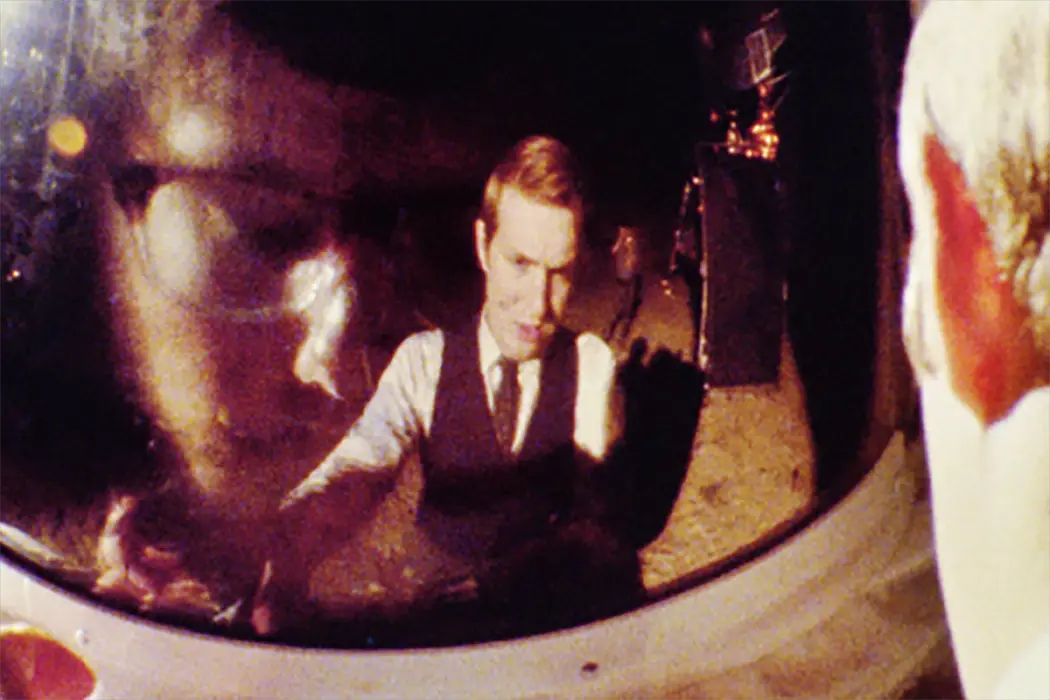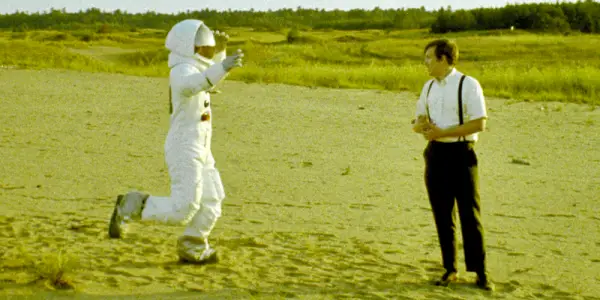OPERATION AVALANCHE Writer Josh Boles On Kubrick, Conspiracy Theories & Scripting Naturalism

Everyone has these really professional biographies and then I'm here…
One of the longest running conspiracy theories is the Stanley Kubrick faked the moon landing myth. Apparently, according to theorists, while directing 2001: A Space Odyssey, Stanley Kubrick worked with NASA to fake the famous first moon-landing footage by using the technology available on set. 2001 is a convincing adventure in space, a technological marvel in set design, which only feeds the conspiracy even more.
Operation Avalanche is a fictional documentary (a mockumentary of sorts) about a team of CIA agents intent on exposing the truth of NASA’s deception. The film plays out as though this is a legitimate found footage documentary, much like Matthew Johnson’s previous film The Dirties.
In this interview with the writer of Operation Avalanche and The Dirties, Josh Boles talks how he and Johnson construct their mostly improvised movies, what makes Operation Avalanche and the Kubrick moon-landing myth such an interesting topic, and his thoughts and inspirations on writing the film.
This interview was conducted by email, and I would like to thank Matthew Miller and Josh Boles for taking the time to make this possible.
What is it about the Kubrick moon landing myth that’s so compelling? Why is it so heavily perpetuated?
Aside from the fact that Kubrick seems like the right guy for the job with the production of 2001 coinciding with the Apollo missions, I think it’s just a fun idea. It seems like Kubrick also thought that the myth was funny based on the reference to it that he put in The Shining, which they go into great detail about in that movie Room 237. Plus, people always think of Kubrick as being shrouded in mystery, so that always helps perpetuate a myth. In reality, I think he was just a guy chilling in his house, working on his projects and watching movies 24/7. But when someone famous isn’t desperate for attention, people treat them like they’re some weird mystery.
How has the production of Operation Avalanche affected your reception of 2001: A Space Odyssey?
I really love 2001. I’ve seen it many times and there’s always more to enjoy each time you watch it. I guess I’ve seen it once since we finished the movie, but honestly, the only thing that’s changed is that I’ve seen more behind the scenes photos now, so I know a bit more about what it looked like on set. Otherwise, the two movies are pretty unrelated.
Forrest Gump inspires awe by projecting their main character in filmic artifacts throughout history. What reaction are you aiming to evoke in your audience by using a similar device?
Awe might be too grand a word for what we were trying to do. I guess it would be more like world building and trickery. Using famous images and myths is inherently compelling because people want to see a new take on a story they already know. It worked for Shakespeare, right? Or like sampling in rap music. Taking an interesting part of one thing and using it as a building block to make something new.
Some of your cast are regular people giving spontaneous performances, how do you write a scene that accommodates that into the story?
Really none of that is written beforehand. Johnson’s very good at eliciting performances from unsuspecting people. Because he’s so weird and charismatic, people’s reactions to him when they meet him are sort of the same whether the camera’s on or not. So basically Johnson will interact with people, try to steer them in a useful direction, then later, during editing, the context of the footage will be changed to fit it into the story.
What do you think to the idea that your mockumentaries’ style of realism is a revitalization/reinvention of the neo-realism movement?
Considering the amount of jackassery that goes into making these movies, Rossellini would probably be rolling in his grave to hear them called neo-realist. But, in the sense of going to real places and using non-actors, there are definitely some of the same elements.
How do you think audiences will react to your fictionalized yet realistic take on an established historical artifact?
I hope they’ll enjoy it, basically. And I hope that neither the people who believe in the fake moon landing conspiracy theory, nor the people who think it’s irresponsible to make a movie that plays with the theory, will take it too seriously. It’s just a movie. We only tried to make it seem realistic to make the story compelling.
You’ve used documentary crews as characters for both films. In The Dirties they remained objective regardless of Matt’s obvious intentions/actions, and now they’re wrapped up in a government conspiracy for Operation Avalanche. How do you feel about the ethics of these documentary crews and their morals regarding the dangerous stories they’ve documented?
That’s part of the fun of these movies really. In The Dirties, we were playing with the absurd idea that documentarians would be amoral enough to follow a kid as he shoots up his school and not intervene at any time. In Operation Avalanche, those characters are fleshed out a little more as being CIA agents, so nobody expects a strict code of ethics from the CIA. A big influence on both of these movies is a great Belgian movie called Man Bites Dog. It’s about a documentary crew following a charismatic serial killer around and eventually getting involved in his crimes.

Creating the moon on earth is a difficult thing to do, as your film certainly explores, what’s the thought process behind writing an indie film with your ambitious production value?
In the beginning, I had my doubts as to whether we could pull it off visually, but the art department and the post production team were really able to do some amazing things to make the ideas come to life. Basically, Johnson thought we could pull it off for the budget we could get, so I thought, ‘Cool. Let’s do it.’ And we came up with all the good ideas we could think of and then had talented people like Chris Crane and Tristan Zerafa do all the hard work.
How did the concept inspire you when writing? Is working with a unique concept the most important thing when writing character and plot, or do you search for inspiration in other places?
Working on a project for Johnson is unique, because he basically makes the same movie over and over again. Which is what he’s good at. But knowing the form it’s going to take, I’m well aware that having an interesting concept is the only way it’s going to work. ‘Johnson does his shtick for an hour and then shoots up a high school’? Alright, that works. ‘Johnson is an undercover CIA agent doing his shtick on the set of the fake moon landing’? That works too. One of the new ones I’ve got for him is the story of Canadian Confederation in which Johnson will play John A. MacDonald and Owen will play George Brown. Canadian history is generally considered to be pretty boring, but if we have Johnson in a fake nose drinking until he pukes in the middle of a Parliamentary session? That works.
Did you have a writing manifesto when it came to Operation Avalanche? What are your main concerns when writing a conspiracy-thriller mockumentary?
The concern for me with the mockumentary or found footage format is always, ‘Why the hell would these cameras be filming this stuff?’ I’m way more of a stickler for logic than Johnson is. Being a bullshit artist of the highest order, Johnson’s really only concerned with getting people to believe him in the moment. Then when you think about it for a bit, the lies he’s telling you fall apart pretty quickly. So logically, the movie isn’t exactly a Swiss watch. But it’s an entertaining romp!
As far as it being a conspiracy thriller, the main concern is finding a balance between the funny stuff and the serious stuff. But that’s something that gets sorted out largely in editing and re-shooting. My job is to come up with the basic story ideas and structure before shooting starts.
Why did you go with the title Operation Avalanche? What is its historical context (if there is any), but also what compelled you to keep it on a personal level?
I can’t remember who came up with that title. It wasn’t me. But I thought it sounded cool. Then we discovered that historically there were several Operation Avalanches before. I’ll let your readers Google it and have a chuckle.
Cinema has been landing on the moon since 1902 with A Trip To The Moon, and film-makers seem to love returning to it. What does Operation Avalanche have to contribute/say about this part of cinema? Especially considering that Moonwalkers, a film that tackles a similar conspiracy theory, came out last year. What will audiences familiar with these films find in Operation Avalanche?
I haven’t seen Moonwalkers, but we didn’t find out about it until after we shot Operation Avalanche. We were sort of like ‘Oh shit’, but then we heard it sucked so we weren’t as worried. I don’t know, maybe it’s good.
Travelling to the moon is always a compelling story because it’s the only other world humans have ever gone to and you can look out the window and get a good look at it with the naked eye.
Have you seen The Dirties? What do you think about the mockumentary genre? Any favourites? Are you interested in seeing the movie? Let me know in the comments below.
Operation Avalanche came out on DVD January 3rd 2017.
Does content like this matter to you?
Become a Member and support film journalism. Unlock access to all of Film Inquiry`s great articles. Join a community of like-minded readers who are passionate about cinema - get access to our private members Network, give back to independent filmmakers, and more.
Everyone has these really professional biographies and then I'm here - writing a monologue... I'm not that kind of critic who approaches a film as though it's in need of grading, I am not an examiner, a film is not a test. In fact, I believe that film is capable of teaching us about the most unbelievable things; things we might have otherwise never known. We are in a constantly expanding world of entertainment, a place where nothing creates just one opinion. We are inhabitants of cinema, each from our own place of origin. Our culture and our understanding of the world informs our reception of each and every film we see. Film criticism is more important than examining a film and simply grading it. We are constantly learning from one another; forever asking: what makes cinema great? and endlessly guessing what we think makes cinema not so great. I'd love to hear your thoughts on the films I write about (and the ones I don't), but I especially hope you enjoy reading about them.













